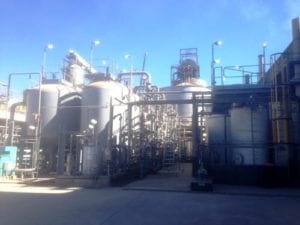As part of paper giant Sappi’s global drive to become the leading supplier of specialised cellulose – a product used mainly in the manufacture of viscose fibres – Veolia Water Solutions & Technologies South Africa has engineered, supplied and tested a new 400 m3/h demineralisation system. This plant has been designed to supply process water for the new cellulose production line.
During the one-year project, Veolia was responsible for the demineralisation plant’s mechanical systems, control systems and pipework. Veolia Water Project Manager, Stuart Lawry explained: “We have designed, manufactured and sourced equipment for three demineralisation trains, each capable of treating 200 m3/h. Two of these will operate at capacity, while the third will be on standby and ready to kick in at any moment, ensuring 99% availability of the water treatment plant.” Veolia was awarded the contract in March, 2012, and successfully commissioned the plant in July, 2013. “One of the challenges resulting from the time constraints included inter-company team work. We had to ensure precise project management and co-ordination between civil contractors, electrical contractors and our suppliers to complete the works,” said Lawry.High-end technology for removing minerals on large scale
Pre-treatment of the feed water involves passing it through a system of five dual media filters (DMF), which use sand anthracite (carbon particles) to remove suspended solids. “We have installed a backwash system for flushing accumulated particles on a daily basis,” said Lawry. Demineralisation occurs in two stages: one removes positively charged cations and the other removes anions, or negatively charged minerals. Both processes depend on an inventory of Ion Exchange resin with chemically-active surfaces. “A regeneration system, using sulphuric acid and sodium hydroxide, was included in the design to flush or regenerate accumulated minerals from these inventories,” he explained. “We decided to use ion exchange technology based on Sappi’s familiarity with Ion Exchange Resin plants. It is a tried and tested system, and is widely supported,” he concluded.






